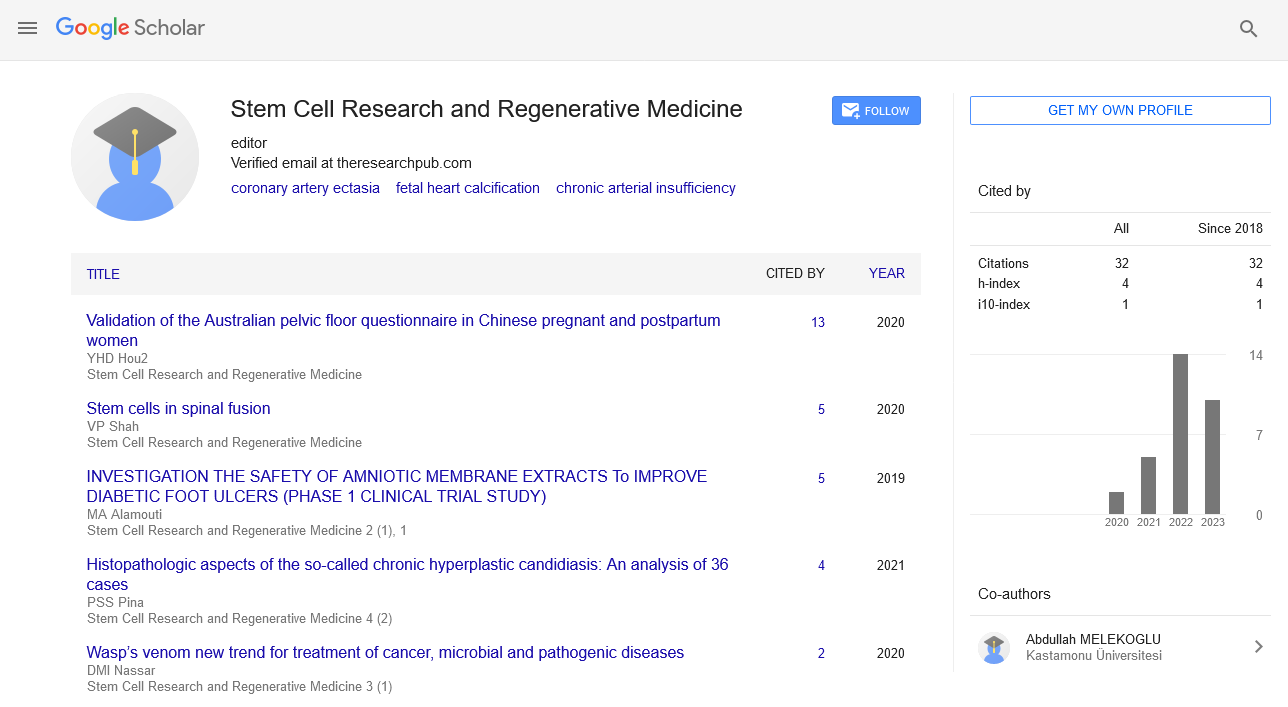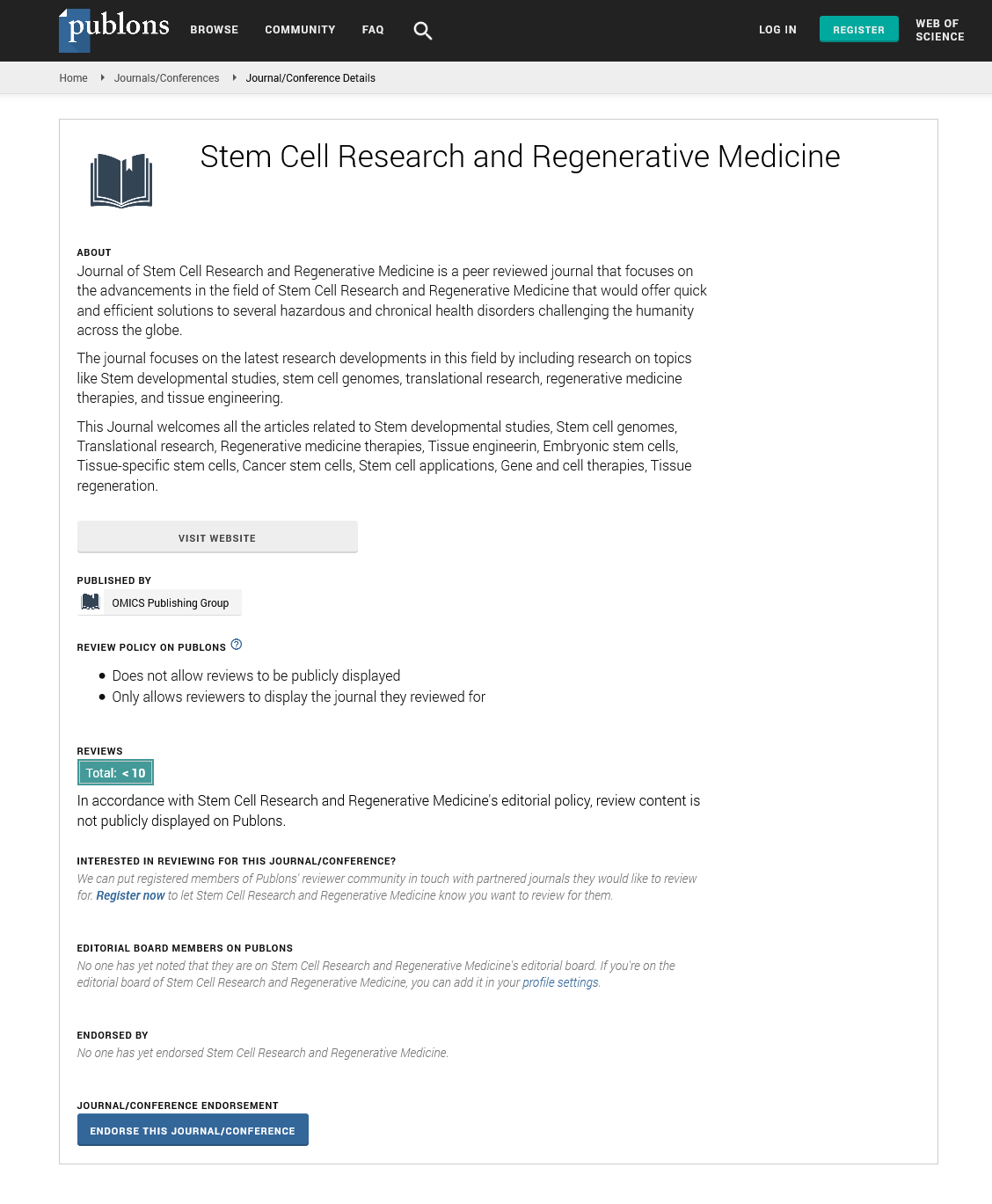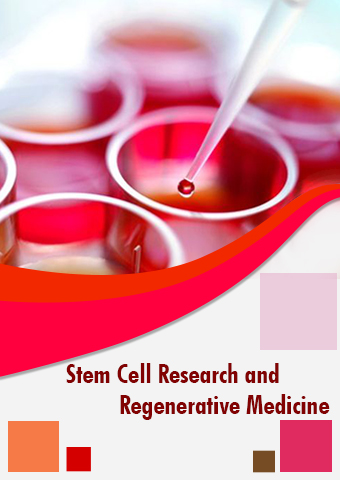Perspective - Stem Cell Research and Regenerative Medicine (2024) Volume 7, Issue 5
Stem Cells and the Future of Personalized Medicine
- Corresponding Author:
- Hao Lei
Department of Surgery,
Jingchu University of Technology,
Jingmen,
448000,
Hubei,
China
E-mail: HaoLei@cookman.edu
Received: 01-Oct-2024, Manuscript No. SRRM-24-149856; Editor assigned: 03-Oct-2024, Pre QC No. SRRM-24-149856 (PQ); Reviewed: 17-Oct-2024, QC No. SRRM-24- 149856; Revised: 21-Oct-2024, Manuscript No. SRRM-24-149856 (R); Published: 31-Oct-2024, DOI: 10.37532/SRRM.2024.7(5).265-266
Introduction
Personalized medicine, a tailored approach to healthcare that considers individual differences in patients’ genes, environments, and lifestyles, is revolutionizing the way diseases are treated and prevented. Stem cells, with their remarkable ability to differentiate into various cell types and regenerate tissues, are poised to play a critical role in advancing personalized medicine. This article explores how stem cells contribute to the future of personalized medicine, highlighting their potential in developing targeted therapies, understanding disease mechanisms, and enhancing regenerative treatments.
Description
The role of stem cells in personalized medicine
Tailored therapeutics through stem cell technology: One of the most promising applications of stem cells in personalized medicine is the development of tailored therapies. Induced Pluripotent Stem Cells (iPSCs), which are derived from adult cells reprogrammed to an embryonic-like state, allow researchers to create patient-specific cell lines. This technology enables the modeling of diseases at the cellular level, providing insights into how individual patients may respond to specific treatments. For instance, cancer researchers can generate iPSCs from a patient’s tumor cells to test various drug responses, allowing clinicians to select the most effective treatment based on the unique genetic profile of the patient’s cancer.
Drug development and toxicity testing: Traditional drug development often relies on animal models, which may not accurately predict human responses. Stem cells offer a more relevant platform for drug testing and toxicity assessment. By creating organoids miniaturized, functional versions of organs using patient-specific stem cells, researchers can better understand how new drugs will interact with human tissues. This approach not only enhances the safety and efficacy of new therapies but also streamlines the drug development process, potentially reducing the time and cost involved in bringing new medications to market.
Regenerative medicine and tissue engineering: Stem cells hold great promise in regenerative medicine, particularly in repairing or replacing damaged tissues and organs. Personalized regenerative therapies can be developed by using a patient’s own stem cells, minimizing the risk of rejection and complications associated with donor tissues. For example, researchers are exploring the use of stem cells to regenerate damaged heart tissue after a myocardial infarction or to repair spinal cord injuries. These personalized approaches aim to restore function and improve the quality of life for patients with debilitating conditions.
Understanding disease mechanisms and biomarkers
Stem cells provide valuable insights into the mechanisms underlying various diseases. By studying patient-specific stem cells, researchers can investigate how genetic variations influence disease development and progression. This knowledge can lead to the identification of biomarkers that predict disease susceptibility, progression, and treatment responses. For instance, understanding how certain stem cell populations behave in diseases such as Alzheimer’s or Parkinson’s can illuminate the underlying biology, paving the way for targeted interventions.
Personalized stem cell therapies
The field of personalized stem cell therapy is rapidly evolving, with advancements in gene editing technologies such as CRISPR offering the potential to correct genetic defects in patientderived stem cells. For example, in the context of genetic disorders like sickle cell disease, researchers can use CRISPR to edit the genes within a patient’s iPSCs, correcting the mutations responsible for the disease. This personalized approach not only addresses the root cause of the condition but also holds the potential for curative therapies tailored to individual patients.
Challenges and ethical considerations
While the integration of stem cells into personalized medicine offers immense potential, several challenges and ethical considerations must be addressed:
Technical and scientific hurdles: The transition from laboratory research to clinical application involves numerous technical challenges. Ensuring the safety and efficacy of stem cell-based therapies requires rigorous testing and validation. Additionally, scaling up production methods for generating sufficient quantities of patient-specific stem cells for therapeutic use presents logistical challenges.
Ethical issues surrounding stem cell research: The use of embryonic stem cells continues to be a contentious ethical issue, raising questions about the moral status of embryos and the implications of their use in research. While iPSCs circumvent some of these ethical dilemmas, concerns regarding their long-term safety and the potential for tumorigenicity remain. Establishing clear ethical guidelines and oversight mechanisms is essential for maintaining public trust in stem cell research and its applications in personalized medicine.
Access and affordability: As personalized medicine becomes increasingly reliant on advanced technologies, there is a risk that these therapies may be prohibitively expensive, limiting access for many patients. Ensuring equitable access to personalized stem cell therapies is crucial for preventing disparities in healthcare and ensuring that all patients can benefit from advancements in medicine.
Regulatory frameworks: The rapid pace of innovation in stem cell research necessitates adaptive regulatory frameworks that can keep up with emerging technologies. Policymakers must balance the need for safety and efficacy with the desire to promote innovation and accessibility in personalized medicine.
Conclusion
The intersection of stem cells and personalized medicine holds transformative potential for the future of healthcare. By enabling tailored therapies, improving drug development, and enhancing regenerative treatments, stem cells are poised to revolutionize the way diseases are understood and treated. However, addressing the challenges and ethical considerations associated with stem cell research is essential for realizing this potential.
As we move forward into an era of personalized medicine, a commitment to responsible research, ethical practices, and equitable access will be crucial in shaping a future where all patients can benefit from the advancements in stem cell technologies. The journey toward personalized medicine is not without its complexities, but the promise it holds for improved patient outcomes and quality of life is undeniable.


